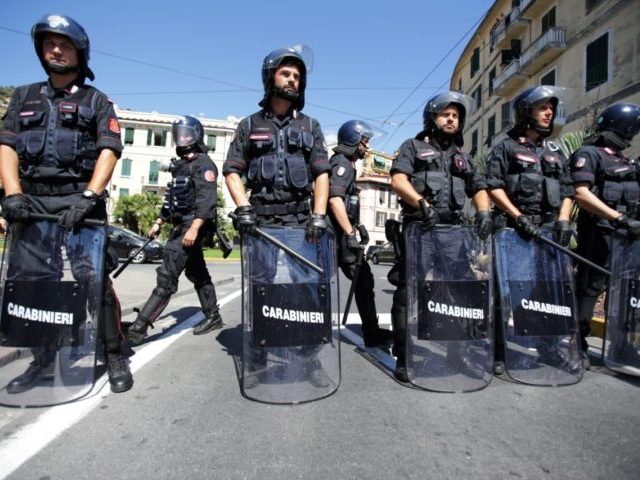As France, Belgium and the UK are pummeled by repeated deadly acts of Islamic terror, Italy has remained relatively unscathed, leading many to wonder aloud wherein lies the key to Italy’s successful counterterrorism efforts.
It certainly hasn’t been a lack of desire on the part of Muslim extremists to target Italy. In its propaganda literature, the Islamic State has declared open war on Rome and the Vatican, stating its intentions to destroy the capital of Christianity.
In one of its videos titled “Meeting at Dabiq,” the Islamic State portrayed its vision of the end of the world culminating in an epic battle in Rome between Islam and the West. The film depicted Islamist militants marching toward Rome’s Coliseum and foretold of a final battle for world domination to be fought in Rome between Islamist true believers and western “crusaders.”
And yet despite their avid wish to conquer Rome, jihadists have so far been ineffective and not a single death from Islamic militants has occurred on Italian soil.
Last week, the Guardian asked: “Why has Italy been spared mass terror attacks in recent years?” In its report, the UK daily suggested that one factor was Italy’s relatively small Muslim population as compared with other European nations.
“The main difference is Italy doesn’t have a big population of second-generation immigrants that have been radicalised or could potentially be radicalised,” said Francesca Galli, an assistant professor at Maastricht University and an expert in counter-terrorism policies.
According to the Pew Research Center, Italy’s Muslim population is about half that of France, both as a percentage of its overall population and in absolute terms. The percentage of Muslims living in Italy is also substantially lower than it is Germany, Belgium or Great Britain.
A smaller population means that ghettoized areas that have become seedbeds of Islamic terror in Paris’ St. Denis area or the Molenbeek district of Brussels simply don’t exist in Italy. With its current crisis of mass immigration from northern Africa, the situation in Italy may be different in the future, but for the moment there are fewer opportunities for Islamic radicalization in Italy.
But a smaller Muslim population alone does not fully explain Italy’s success in thwarting Islamic terror efforts. There are strategic and tactical differences as well, experts point out, including a greater willingness to profile potential terrorists and to immediately deport foreigners who pose a terror threat.
According to the Italy’s interior ministry, counter-terrorism authorities stopped and questioned 160,593 people between March 2016 to March 2017. They also interrogated some 34,000 people at airports and arrested around 550 suspected terrorists, sentencing 38 on terrorism charges. They have also shut down over 500 websites while monitoring nearly half a million more.
Only since January, Italy has deported 135 individuals who allegedly presented a security threat to the country.
In 2015, a leading military analyst put forward Italy as a model of counterterrorism done right, noting that despite many factors going against it, Italy has not suffered a single death from Islamic terrorists.
In an essay in the Nikkei Asian Review, Romanian-born political scientist and military analyst Edward N. Luttwak proposed that much of Italy’s success in counterterrorism lies in its willingness to deport those it considers to be a threat to national security.
Luttwak contrasted Italy with France and Belgium, noting that although Italy is much more vulnerable than they are, it has been far more effective at stopping would-be terrorists before they strike.
Whereas France has been “caught by surprise again and again by terrorist attacks with many lives lost” and in Belgium “terrorists have been coming and going for years, buying military weapons with remarkable ease,” Italy has remained untouched.
So despite the fact that the Vatican is the “most iconic target in Europe,” and tops the list of objectives of the Islamic State, as yet, “nobody has been killed by Muslim terrorists in Italy,” Luttwak noted.
By acting quickly to deport credible threats to Italian security, Italian authorities are able to keep numbers of suspected potential terrorists within a reasonable range and thus are able to monitor them effectively, he said.
This week, Italian leaders have suggested they may finally be ready to block the massive flows of migrants arriving by sea from North Africa, declaring that the current situation is “unsustainable.” If they wish to maintain their leadership in countering Islamic terrorism, there seems little other choice.
Follow Thomas D. Williams on Twitter Follow @tdwilliamsrome

COMMENTS
Please let us know if you're having issues with commenting.